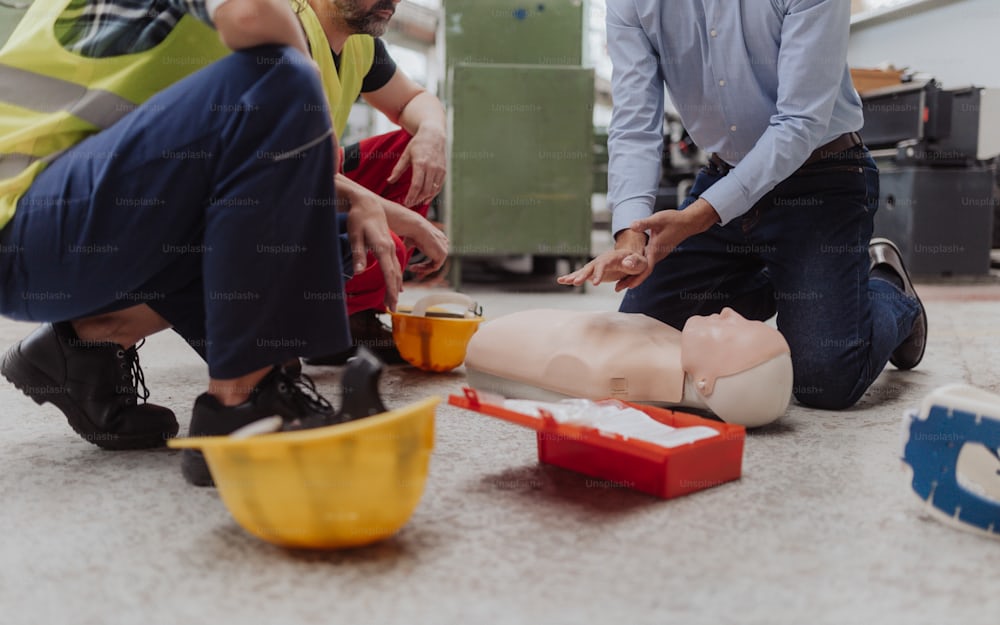Safety and preparation are of paramount importance. The importance of first-aid training is often underestimated, even though many workplaces are focused on safety standards and operational safety. Mandatory first aid and CPR in the workplace is a crucial step to save lives, reduce the severity of injury, and foster safety and preparedness. This article examines the reasons why first aid training should be a mandatory requirement at every workplace.
Urgent Response To Emergencies
Emergencies can strike at any point in time or anywhere. No matter what the emergency is, training employees in CPR or first aid can ensure they receive immediate and appropriate care. A trained staff can save lives in the crucial first few minutes of an emergency. First aid and CPR courses equip employees with skills that allow them to stabilise injured people until professional medical help arrives. This immediate response will improve the odds of survival.
Reducing Injuries Severity
First Aid Training isn’t only about life-saving interventions. It also covers how to manage less severe injuries. First aid training enables employees to manage situations such as cuts or burns and helps them recover faster. By applying the correct techniques quickly, trained individuals prevent minor accidents from escalating to more serious conditions.
Creating A Safer Workplace
Inherently, a workplace that has employees trained in CPR/first aid will become a safer place. The knowledge and skills gained from CPR and First Aid courses allow employees to recognise hazards and prevent accidents. This increased awareness leads to a safer workplace, as employees are more attentive and conscious of their surroundings. As a result, first aid training is a great way to remind employees of the importance of workplace safety. It reinforces safe practices and helps reduce the likelihood of accidents.
Increase Employee Morale And Confidence
First aid can improve employee morale. Knowing they can handle emergencies with confidence gives employees a greater sense of empowerment. This confidence is not limited to the workplace. Employees use their valuable skills outside of work, which benefits their families and communities. Investing in first aid courses shows employers’ commitment to their employees, which increases job satisfaction. Employees are motivated and productive when they feel valued.
Legal And Regulatory Compliance
Many countries require that all workplaces have first-aid trained personnel and sufficient first-aid equipment. Employers may adhere to requirements and prevent any legal consequences by providing required CPR/first aid training. Australia wide first aid assistance standards state that workplaces should have enough first aiders trained to help immediately in an accident. Failure to comply can lead to penalties and liability, especially when an incident occurs at the workplace and it is determined that it was not adequately prepared.
Long-Term And Cost-Effective
First aid training is not an unnecessary expense for employers. It’s a good investment. The costs of workplace injuries, such as medical expenses, compensation, and lost productivity, are often substantial. Employers are able to reduce these costs if they ensure their employees have the training necessary to handle emergencies effectively and promptly. This may lower insurance rates and the number of compensation claims. In the end, having a prepared workforce is more cost-effective than initial training.
Safety For The Community
The benefits of mandatory CPR/first aid classes extend beyond the workplace and contribute to the overall safety of communities. Employees who have been trained in CPR and first aid are valuable assets during any emergency. The introduction of first-aid training in a large number of communities can have an impact on the lives of many people. This broad impact shows the importance of promoting first-aid education as an essential skill for everyone.
Conclusion
Make first aid mandatory for all workers in the workplace. This is an important step to ensure their safety and well-being. A quick and effective response in emergencies can save a life, reduce injuries, and create a better work environment. Mandatory CPR/first aid courses not only benefit employees and employers directly, but they also help ensure legal compliance. They also promote safety within the community. Employers in Australia can promote a culture of readiness and equip their workers with the necessary skills by investing in Australia-wide first-aider training. This proactive approach is necessary to protect lives in the current unpredictable world.
Keep an eye for more news & updates on DiscoverTribune.Org!




